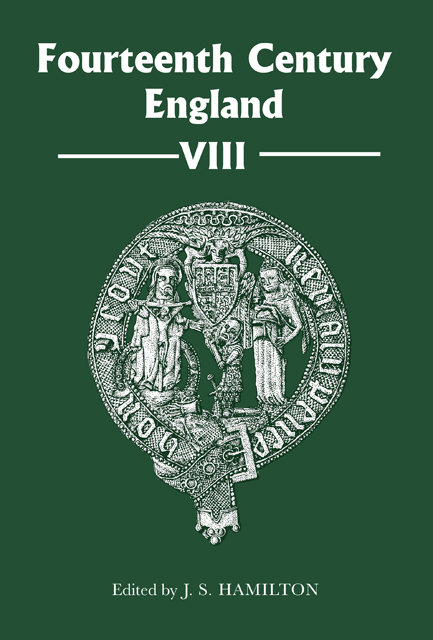Book contents
- Frontmatter
- Contents
- Contributors
- Preface
- Abbreviations
- King's Armourers and the Growth of the Armourer's Craft in Early Fourteenth-Century London
- In the Best Interest of the Queen: Isabella of France, Edward II and the Image of a Functional Relationship
- The First Entry of the Bishop: Episcopal Adventus in Fourteenth-Century England
- Temporalities Be Taken: Edward III, Unruly Ecclesiastics and the Fight for the Benefices of Exeter, 1337–60
- The Armour of Sir Robert Salle: An Indication of Social Status?
- Richard II, the Mortimer Inheritance and the March of Wales, 1381–84
- War, Chivalry and Regional Society: East Anglia's Warrior Gentry before the Court of Chivalry
- A ‘Sterre of þe See to ȝyue Lyȝt to Men’ and ‘Myrroure to Alle Sinful’: A Comparative Analysis of Biblical Women in the English Wycliffite Sermons with John Mirk’s Festial
- Index
- Fourteenth Century England issn 1471–3020
Temporalities Be Taken: Edward III, Unruly Ecclesiastics and the Fight for the Benefices of Exeter, 1337–60
Published online by Cambridge University Press: 15 February 2023
- Frontmatter
- Contents
- Contributors
- Preface
- Abbreviations
- King's Armourers and the Growth of the Armourer's Craft in Early Fourteenth-Century London
- In the Best Interest of the Queen: Isabella of France, Edward II and the Image of a Functional Relationship
- The First Entry of the Bishop: Episcopal Adventus in Fourteenth-Century England
- Temporalities Be Taken: Edward III, Unruly Ecclesiastics and the Fight for the Benefices of Exeter, 1337–60
- The Armour of Sir Robert Salle: An Indication of Social Status?
- Richard II, the Mortimer Inheritance and the March of Wales, 1381–84
- War, Chivalry and Regional Society: East Anglia's Warrior Gentry before the Court of Chivalry
- A ‘Sterre of þe See to ȝyue Lyȝt to Men’ and ‘Myrroure to Alle Sinful’: A Comparative Analysis of Biblical Women in the English Wycliffite Sermons with John Mirk’s Festial
- Index
- Fourteenth Century England issn 1471–3020
Summary
The anticlerical period often attributed to Edward III’s reign saw a concerted royal effort to maintain control over a lower clergy that increasingly acted against the king and the interests of his realm. Papal provisions and English advowson rights had long been a subject of contention in English church– state relations. The tumultuous political atmosphere of the mid-fourteenth century, coupled with attempts on both sides to consolidate resources, created a situation in England in which it was often difficult to know which party had legal claim to present to a benefice. The lower clergy took advantage of the opportunities provided by this confusion by ruthlessly seeking these offices, often to the detriment of the bishops and in derogation of the king’s right. Cases of physical occupation and other forms of clerical dissent present in the plea rolls illustrate not only the lengths to which provisors were willing to go to secure their positions, but the subversive nature of their behaviour towards the will of Edward III. The king’s increased litigation against these clerics in the mid-1340s was a direct response to these activities and an attempt to reassert his authority over the clergy in these matters. In the wake of the Black Death, Edward redoubled his efforts to control these unruly lower clergy through the Statutes of Provisors (1351) and Praemunire (1353). In so doing, Edward restored some semblance of order to the English lower clergy.
Historians have frequently cited the 1340 crisis with Archbishop Stratford and Edward’s subsequent removal of ecclesiastics from his administration as a crucial moment in the political relations between the church and the English state. The dismissal of these ministers – and Edward’s strident declarations that he would never again install a bishop as chancellor – marked the beginning of a period during which his agenda was driven by what some historians have termed ‘anticlericalism’. During the following years (1340–52), Edward clashed with the church over questions of jurisdiction and was at odds with both the pope and the English clergy on administrative, political and personal levels. Although much work has been done to show that the 1340s were perhaps not as volatile as previously thought,3 there appears good reason to argue that ongoing crime, increasingly restrictive policies towards the clergy, and the looming war with France contributed to a turbulent political atmosphere in England.
- Type
- Chapter
- Information
- Fourteenth Century England VIII , pp. 59 - 82Publisher: Boydell & BrewerPrint publication year: 2014



